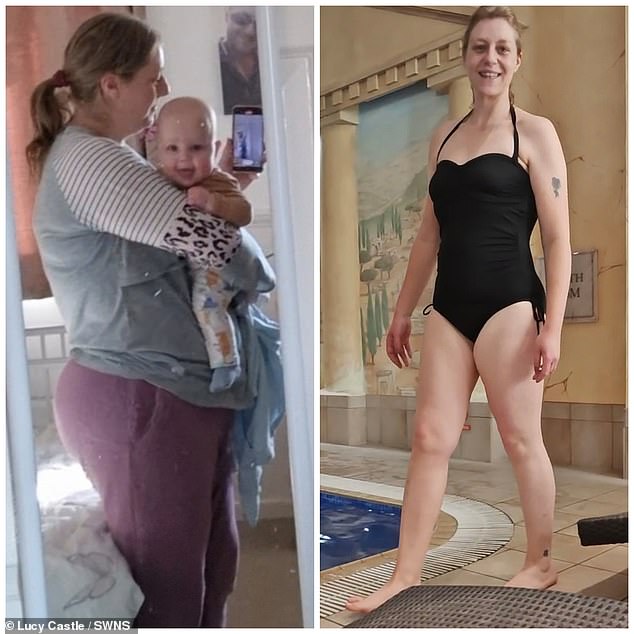[ad_1]
A busy mother-of-three dropped an impressive four stone in only a matter of months by kicking her £1,200-a-year addiction to cheese.
Lucy Castle, 41, from Leicestershire, fell into a trap of unhealthy eating—gorging on oven baked camembert, brie and french bread—whilst she ran around after her three boys.
But when she was diagnosed with type two diabetes in March 2024, she knew something had to change.
‘I was a busy mum so I used to find the quickest easiest option,’ the diet consultant and women’s wellness coach said.
‘But cheese was wrecking my life. I was spending £25 a week on different cheeses. My favourite was brie,’ she added.
As well as covering her meals in cheese, she would also snack of chocolate bars and crisps throughout the day, before ordering a takeaway—whatever was ‘easiest’.
But after having her youngest son, now two, Ms Castle’s health quickly began to decline as she struggled to lose the baby weight and her confidence plummeted.
‘I wasn’t feeling well. I was dizzy. I had pins and needles and come out in sweats,’ she said.

Lucy knew something had to change after her health rapidly declined and she was diagnosed with type two diabetes

Lucy managed to drop four stone in just four months on a restrictive diet plan that saw her reverse her diabetes diagnosis
‘I used to avoid social events, hide away in baggy clothes and I couldn’t keep up with my boys.’
Then after visiting her GP, the mother-of-three was diagnosed with type two diabetes—a common condition in which the body struggles to make enough of the hormone insulin, increasing the risk of heart disease, kidney disease and even stroke.
Unlike type one diabetes however, the condition is preventable and can be managed through diet and exercise.
‘That was my wake-up call,’ Ms Castle said.
Determined to reverse her diagnosis and be able to keep up with her growing boys, Ms Castle tried the 1:1 diet—a very low calorie diet plan designed for rapid weight loss, also known as the Cambridge diet.
The plan involves eating four replacement meals a day—specially made shakes, soups, porridges and snack bars—which fulfil a person’s daily nutritional requirements while avoiding added calories.
The diet works by putting the body into a state of ketosis—forcing it to burn stored fat rather than carbohydrate for energy.
Ms Castle, who now supports others with their weight loss journeys, said: ‘Seeing the scales every week and my weight going down—it kept me motivated.

At her heaviest Lucy weighed 16st and struggled to play with her three young boys

Lucy said she used to hid away in baggy clothes and avoid social events because of her weight
‘Before I couldn’t keep up with my children. My back was hurting—my knees, my hips. Now I have more energy.
‘I feel so much happier, my health is back on track and I’m enjoying life with my boys more than ever.’
The busy mother managed to lose a stone a month, totalling an impressive four stone on the diet which she has now stopped in favour of home-cooked meals such as chicken stir-fry and healthy snacks after reversing her diabetes.
She added: ‘For the first time in years, I now love shopping for clothes that make me feel amazing.’
Now the mother-of-three hopes to inspire others to lose weight and prioritise their health.
‘You can do this too,’ the wellness coach said. ‘Take it one day at a time, stop being hard on yourself, and practice self-love.
‘It’s not just about losing weight—it’s about finding yourself again.’
The Cambridge diet remains one of the most restrictive diets out there and a popular alternative to blockbuster weight loss jabs such as Ozempic and Mounjaro.

Lucy was determined to lose the weight so she could keep up with her three sons, who are now aged two, nine and 15.
Participants are given a low-calorie diet, totalling around 800 calories a day for between 12 and 20 weeks.
Dieters on the plan will also get support from a nurse or dietitian to reintroduce healthy foods and maintain weight loss, while medications for type two diabetes can be stopped if seemed safe.
Adults who have been diagnosed with type 2 diabetes in the last six years and have a BMI of over 27 are eligible for the programme.
Since its launch in 2020, over 25,000 people have been offered the NHS soup and shake programme, with the number to double in the next five years.
However, experts have warned that forcing the body to burn fat rather than carbohydrates can have devastating consequences for women’s health.
Lisa Goldstein, a leading nutritionist who specialises in reproductive health told the Daily Mail: ‘When you don’t eat enough – especially too few carbs – your brain can switch off ovulation.’
Medically known as hypothalamic amenorrhea, this is the body’s way of avoiding pregnancy when energy reserves are low, she explained.
This can be caused by being on a calorie-restrictive diet.
‘Unlike men, women’s reproductive systems require a minimum threshold of calories, carbs and body fat to function’, she added.
The 1:1 diet has also been linked to muscle loss, fatigue, diarrhoea and gallbladder stones.
[ad_2]
This article was originally published by a www.dailymail.co.uk . Read the Original article here. .

